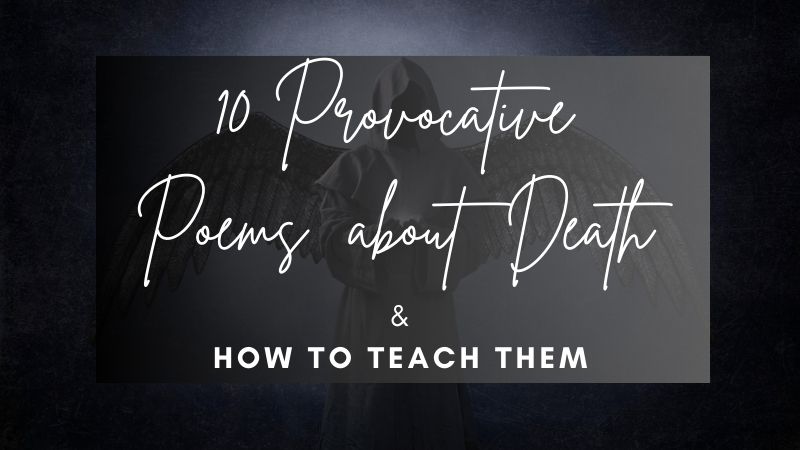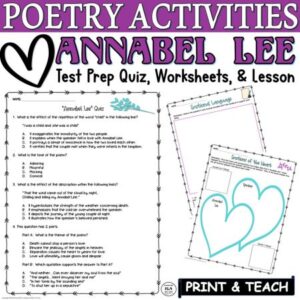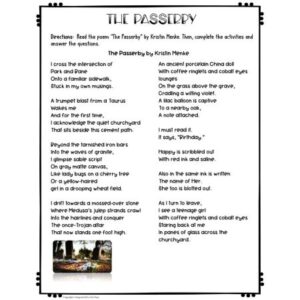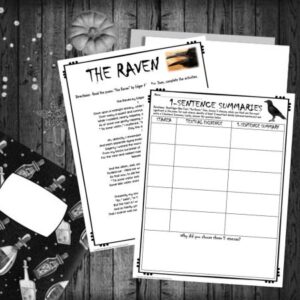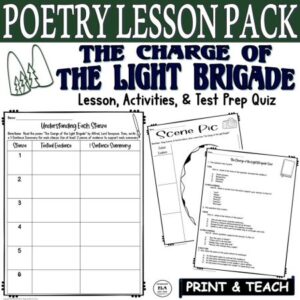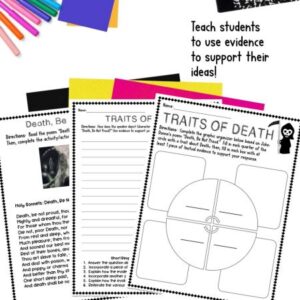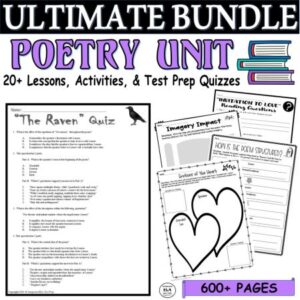Typically, reading poems about death can be a big bummer. Maudlin musings describing the death of a loved one can greatly affect any audience, including the students in your classroom. Even though most people are fascinated by death as evidenced by movies, music, and television shows, reading poems about death is another level altogether.
It all depends on our choice of poetry, how we introduce the topic, and what activities we use to teach the standards. Reading poetry about death does NOT have to be a somber or depressing time.
Death is a natural part of life. There is a time for life and a time for death. Remembering those who have died by writing poetry has been a time-honored tradition!
If you want to help with teaching poetry about death in relevant and engaging ways, keep reading below for 10 Provocative Poems About Death & How To Teach Them!
Need help with Test Prep? Check out this FREE Pack of 3 Test Prep Activities to help students achieve success on standardized tests!

10 Provocative Poems About Death & How To Teach Them
What does it mean to be Provocative?
The word “provocative” comes from the idea of calling one to action in some way. And I like to think that poetry still has the power to provoke something in us. Poetry, if well-written, has a message and a challenge for us, even if it was written many, many years ago.
After all, poetry can follow or break certain structural rules. It can use whatever words it wants. It can be about any topic. It can be long or short. It can be anything in a form different from prose.
As a uniting objective for teaching these poems about death, you might want to discuss the word poetry and what place it has today in terms of being provocative…I would argue that almost all poems have purpose and value, even if our students don’t readily see this truth.
Bringing these poems about death into the realm of relevancy is vital to our student’s education. We can all learn something from poetry if we are open to it!
How To Start Teaching Poems About Death
When it comes to incorporating poems about death into our lesson plans, there needs to be an element of sensitivity. Focusing on just DEATH, DEATH, and more DEATH might be too much for our students. This is why we need to teach these poems as sources of important messages (themes) and as opportunities to practice analytical skills.
Following these steps will help in the process of teaching poetry about death:
- Bell-Ringer: Have a focus for the day linked to the poem. You can introduce 1 or 2 vocabulary words, provide a picture connected in some way to the poem, offer a line or two from the poem to analyze, etc. Students can then write about these concepts in 2-3 sentence reflection! Super simple and it gets their critical thinking skills activated!
- Mini-Lesson: Discuss the standard for the day. If you want to teach theme (message about a topic from a text written in a complete sentence), model a theme (message) from a movie or show, work together as a class to create a theme from a film or piece of literature you have read this past year, and allow students to write messages from movies they like. Be sure to mention that examples from a text determine the theme. Without evidence, you cannot create a theme for what you are reading as it is not just a guessing game or what they “feel.”
- Reading/Analyzing: Either read poetry with students or find online recordings. Having students read poetry silently is definitely NOT effective, especially when it comes to reading higher-level literature. I always like to read a poem aloud without stopping the first time. Then, I model how to take notes or annotate for the skill. If you want your students to eventually come up with a thematic statement, you can identify evidence for MAJOR IDEAS and what the speaker/poet is relaying (THEME) about those ideas.
- Work Period: Provide an activity connected to the skill. If you want students to be able to write a thematic sentence or develop their ideas into a paragraph more fully examining the theme, they need to see examples on the board. It should not be from the poem, as we want our students to be able to write about the poem. Instead, offer an example from another text. You could also start with one of the poems about death and students can use all of the work from the first poem as exemplars for other poems you read!
- Reflection/End of Class: There are so many ways to end class. You could require an exit slip with questions about the poem/standard/skill. Students could present their work to the entire class or in small groups. You might conduct a discussion about the poem with questions students create! Or you could extend the ideas within the poem; students could create a visual of the OPPOSITE theme(s), write an addition to the poem, or create a poem with a similar format! The possibilities are endless!
If you need a fun and easy way to teach about theme, check out this pack–>>>Themes Made Easy!
10 Provocative Poems About Death
1. Annabel Lee
There is so much to love about “Annabel Lee” Edgar Allan Poe. Its romanticism of everlasting love as well as the pain and agony of a soulmate’s death make this text prime for inclusion in a Poems About Death Unit!
You could discuss the setting (description of time and place), analyze the various literary devices, examine the shift in tone, summarize the poem, or reflect on the poem’s ending. (We don’t really know how the poem ends; is the speaker figuratively or literally going to stay by her gravesite for the rest of his life? With Poe, the master of poems about death, we cannot be sure!)
Want to save time this week with EASY-TO-TEACH activities and a test prep quiz? Click below!
2. The Passerby
Kristin Menke’s “The Passerby” tells the story of a teenager passing through a cemetery. She comes to a specific grave, examines it, and does not fully comprehend what she sees until the end of the poem. Spooky, right?
You could discuss the symbolism behind the poem’s title, analyze the use of first-person perspective, and encourage your students to write their own poems about death involving a cemetery. Taking the time to visualize a stanza or two would also be a fun activity!
Still searching for short story ideas this year? Click below for help!
3. The Raven
Although Edgar Allan Poe’s “The Raven” initially seems to be the story of a crazed man and a bird, it is actually one of the most famous and taught poems about death in American Literature.
Here are some infamous lines from the poem:
4. The Charge of the Light Brigade
I love “TheCharge of the Light Brigade” by Alfred, Lord Tennyson! This poem centers on a group of soldiers valiantly entering an impossible battle, knowing the outcome is certain death. In the case of this poem, their deaths center not on love, but on a final act of bravery.
The incredible imagery, prolific figurative language, and thematic ideals make this poem a keeper for a Poems About Death Unit!
5. The Bells
As a teenager who participated in my high school choir, we sang many songs about life and death; however, one I clearly remember was a song created from Edgar Allan Poe’s “The Bells.” A lyricist had modified the poem into a song, and I still remember the melody to this day.
The poem’s ever-present tension produced through extreme repetition, story-telling techniques, and onomatopoeia makes for an interesting class reading! Plus, the stanza connected to a wedding COULD be examined in conjunction with “I Can Hear the Bells” from the movie Hairspray!
To begin your class, you might start with a journal entry:
When you think of bells, what words, ideas, or images come to mind?
I never realized how much bells played various roles in our culture today.
To make teaching this poem a bit easier, click HERE!

6. The Poison Tree
William Blake’s “The Poison Tree” has another spin on death, as it focuses on a cause of death: REVENGE. Who doesn’t like a spicy story once in a while about revenge?
You might choose to pair this poem with Poe’s “The Cask of Amontillado” because of their similar themes!
The first-person narration, the story-like structure, and quick reading make this poem a must-teach, especially if you need ideas for teaching poetry throughout the year, during the Halloween season, or to easily prepare for state tests.
7. Because I Could Not Stop For Death
Emily Dickinson has written many poems about death, but her most famous poem is likely “Because I Could Not Stop For Death.”
I think all of us at some point in our lives have thought about how we are going to go…Will it be sudden or slow, painful or peaceful, dramatic or quiet?
Death, in this poem, is personified and the journey towards death is neither scary nor sad. Dickinson relays death as an eventual part of life, a breath of fresh air amongst more melodramatic poems about death.
You could focus on various literary devices, syntax, mood, and theme as you incorporate this poem into various Thematic Units! Tracing the journey of the speaker by examining and visualizing the stanzas would be a fantastic lesson and cover the standards: Citing Evidence, Order of Events, and Characterization!
8. Death Be Not Proud
John Donne’s “Death Be Not Proud” is a very short poem; however, it is packed with strong diction, religious allusions, and a powerful message about death. You will certainly need to read this poem with your students, as its vocabulary is quite overwhelming even for the most seasoned reader. Come to think of it; most poems about death should be read aloud. It brings the poetry “to life!”
Diction: thy, thou, shalt, dwell, swell’st, thee
Instead of avoiding these words, you might have students replace certain words with modern iterations:
Ex. thou/thee = you
Ex. thy = your
Ex. dwell = live
Ex. swell’st = swell/grow
My favorite part of the poem lay in the last 2 lines:
There is clearly a religious allusion in this description of Death’s final fate, and it is quite comforting to think about a life of eternity without the fear of Death.
Extending this poem into a response from Death to his end or a descriptive paragraph about life past death (or lack thereof) might be interesting ways to make the poem come alive to our students! Or if you want to prepare your students with a bit of poetry test prep, click here—> Death Be Not Proud Pack!
9. Ozymandias
Oh, I love Percy Bysshe Shelley’s poem about what happens when a supposedly “great” and “powerful” ruler must submit to the inevitability of death.
QUESTIONS TO CONSIDER:
How many people truly remember any conquerors from years ago?
What people throughout history truly make a lasting difference?
What impact will we have on the world, if any?
This poem reminds me of how quickly we will be forgotten, even if we are supposedly famous or significant at a moment in time. Nothing lasts!
10. My Fears
If you happen to be teaching more middle-school-aged students, you might consider “My Fears” by Kristin Menke to include in your poems about death. Below is the first stanza:
They start out quite small creeping into your day
Of what could happen creating dismay.
They dig into your soul and swallow you whole
Until all of your world is in their control.
Inevitably, our fears are all-consuming. They can make us “dead” in many ways like killing our dreams, destroying who we are, and affecting our physical bodies more than we think.
Plus, one of people’s greatest fears is death and how it might happen. Ultimately, no one can escape it.
By reading poems about death like “My Fears,” we might come to see death as a vital part of life. Without death, we might not value life nearly as much.
Why teach poems about death in today’s classroom?
I say this with all sincerity: Why not? Not everything surrounding death has to be a morose introspective activity. We can help emphasize that this tough topic is essential to all of us!
POETRY RESOURCES THAT INCLUDE MOST OF THE ABOVE POEMS ABOUT DEATH
Do your students need help with poetry analysis? This POETRY TEST PREP ULTIMATE BUNDLE contains 20 EASY-TO-TEACH Lessons, ENGAGING Reading Comprehension Activities, and STEP-BY-STEP Writing Responses! It includes quizzes that mimic standardized tests with QUESTIONS and ANSWERS (for 20 poems including “A Poison Tree,” “Annabel Lee,” “I Hear America Singing,” “The Raven,” “I Wandered Lonely as a Cloud,” etc.) based on the Common Core Reading standards!
JUST PRINT & TEACH!!
Need more fun ideas that incorporate poems about death? Check out my store Kristin Menke-Integrated ELA Test Prep!

